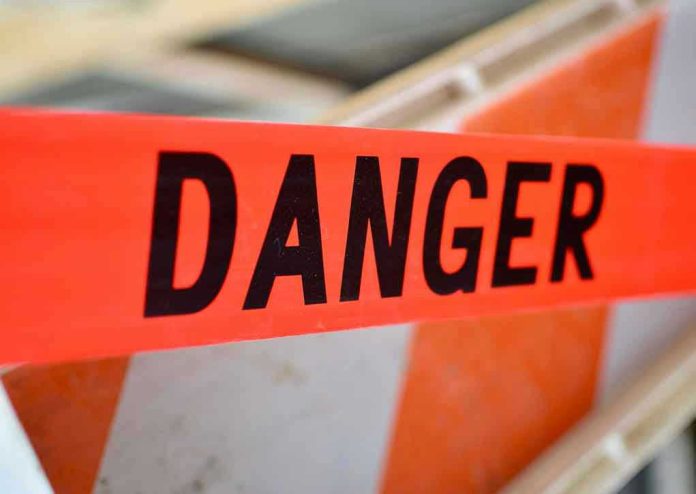
ICE agents forced to wear masks on the job—thanks to a staggering surge in assaults and doxxing—have become the latest target of political outrage, as left-wing lawmakers now try to ban the one thing keeping our agents and their families safe.
At a Glance
- ICE agents now routinely mask their identities after a reported 700% spike in assaults and doxxing incidents.
- Tom Homan, Trump’s border czar, fiercely defends the policy amid backlash from activists and leftist politicians.
- Liberal lawmakers have introduced legislation to restrict ICE’s ability to wear masks during enforcement operations.
- The controversy highlights the deepening divide over law enforcement, border security, and civil liberties in America.
ICE Agents Mask Up Amid Assaults and Threats
For decades, ICE agents did their jobs in the open. That changed as anti-ICE mobs started following agents home, slapping their photos and addresses online, and making direct threats against their families. The situation reached a boiling point in 2025, when Tom Homan, Trump’s newly appointed border czar, revealed a jaw-dropping 700% increase in assaults and doxxing of ICE officers. That’s not a typo. Seven. Hundred. Percent. Suddenly, wearing masks isn’t about hiding from accountability—it’s about survival for the men and women charged with enforcing our laws.
Homan has been relentless in calling out the absurdity of blaming ICE for trying to protect their own. The left’s narrative paints these officers as shadowy villains, but the reality is that they’re now targeted at work and at home, with their spouses and kids facing harassment. Homan’s response to liberal critics is as blunt as it gets: if you don’t want ICE agents to wear masks, maybe stop threatening their lives. It’s a message that resonates with Americans fed up with criminals being coddled while law enforcement is demonized.
Progressive Lawmakers Cry Foul, Push Mask Ban
Predictably, as soon as ICE agents started masking up to protect themselves and their families, the left went on the offensive. Senators Cory Booker and Alex Padilla rushed to introduce legislation that would bar ICE from wearing masks during most operations. Their argument? Masks “undermine transparency” and “threaten civil rights.” You can’t make this up. Somehow, the same crowd that cheers lawless mobs wearing masks in the streets suddenly demands total visibility and exposure for federal officers facing real danger.
Immigrant rights activists and progressive lawmakers claim that masked agents open the door to racial profiling and abuse. But let’s be clear: there’s not a shred of evidence that agents are using masks to duck responsibility. The only thing these masks do is prevent violent activists from identifying, doxxing, and physically attacking the people tasked with enforcing the law. The agenda here has nothing to do with “civil rights”—it’s about making ICE’s job impossible, and ultimately stopping enforcement altogether.
A Nation Divided Over Law Enforcement and Rights
The debate over ICE agents masking up exposes just how deep the political and cultural rift in this country runs. On one side, Americans who believe in law and order want agents protected so they can do their jobs without fear of retribution. On the other, activists and politicians—many with zero skin in the game—demand “transparency” for officers while doing everything in their power to shield criminals from consequences. The result is a climate where enforcing federal law is treated as a crime, and defending American sovereignty is met with outrage.
The Trump administration is standing firm. Homan and his team have made it clear: the safety of ICE agents and their families comes first. Masking will continue until the threats subside and Congress gets its priorities straight. Meanwhile, the backlash from the left only intensifies—fueling more protests, more anti-ICE rhetoric, and a media frenzy desperate to paint federal agents as the villains. Americans who are tired of this upside-down world are left shaking their heads, wondering how we got to a place where protecting law enforcement is somehow controversial.



